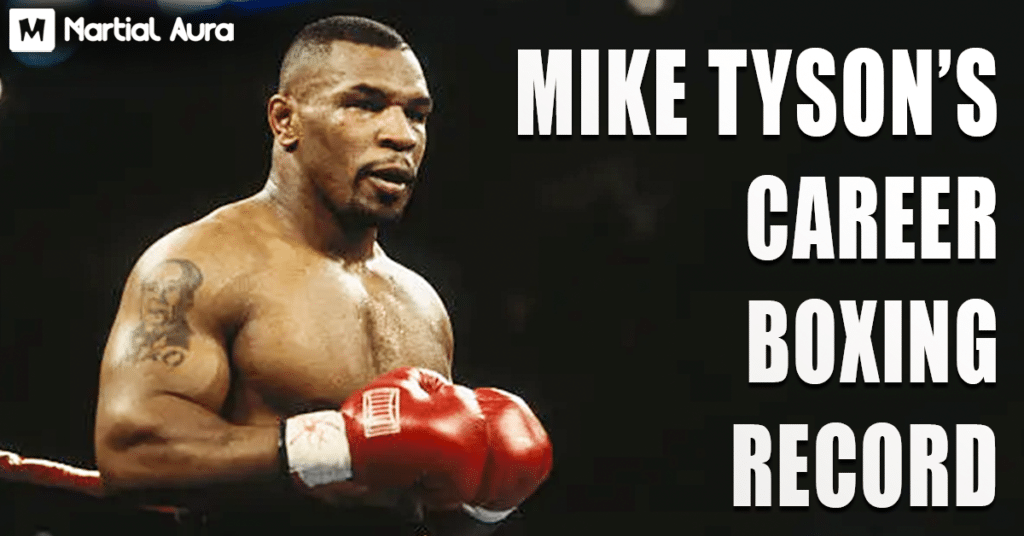Mike Tyson is often regarded as one of the most feared men ever stepping into the boxing ring. His incredible power, speed, and aggression earned him a unique place in boxing history. From the heights of being the youngest heavyweight champion ever to the lows of personal and professional defeats, Tyson’s career spanned over two decades and remains one of the most compelling stories in sports. But what exactly is Mike Tyson’s boxing record?
In this article, we’ll analyze Mike Tyson’s career stats, including his wins, losses, knockout victories, and other notable achievements. We’ll also explore how Tyson’s record compares to that of other legendary boxers and what his career meant to the world of professional boxing.
What Is Mike Tyson’s Career Record?
Mike Tyson’s career in the ring was nothing short of remarkable. He competed in a total of 58 professional fights, and while his career wasn’t free from setbacks, his record still stands out as one of the most impressive in boxing.
Here’s a summary of Tyson’s career record:
- 50 wins
- 6 losses
- 2 no contests
- 44 knockout victories
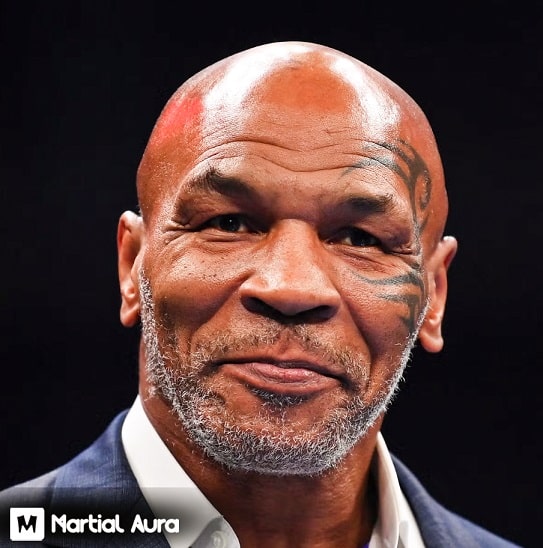
What makes this record even more impressive is that 44 of his 50 wins were by knockout. Tyson’s ferocious style, which relied on swift and powerful punches, made him a knockout artist of the highest caliber. His knockouts weren’t just victories; they were often devastating and quick, ending fights before his opponents could even get started.
Early Career and Meteoric Rise
Mike Tyson’s early career was nothing short of sensational. With the support of his legendary trainer Cus D’Amato, Tyson made his professional debut on March 6, 1985, at just 18 years old.
He quickly made a name for himself by winning his first 19 professional fights, all by knockout. In fact, many of these knockouts occurred in the first round, showcasing Tyson’s immense power and ability to overwhelm his opponents.
- 1985-1986: Tyson’s first two years in professional boxing were marked by domination. He won 27 consecutive fights, with 25 knockouts. This streak rapidly elevated him to the status of a rising star in the boxing world. By 1986, Tyson had knocked out well-known contenders such as Marvis Frazier and Jesse Ferguson.
Becoming the Youngest Heavyweight Champion
Tyson’s career reached its first major peak in November 1986 when he fought Trevor Berbick for the WBC Heavyweight Title.
Tyson was just 20 years old at the time, and as a result, he made history by knocking out Berbick in the second round, becoming the youngest heavyweight champion ever. Consequently, this victory cemented his place in boxing’s elite and is one of his most celebrated accomplishments.
Mike Tyson Boxing Records
While many fighters have impressive careers, few can match the numbers and statistics that Mike Tyson posted during his prime years. Tyson’s boxing record is a mix of breathtaking victories and a few humbling defeats, each of which contributed to the evolution of his career.
Comprehensive Boxing Stats
Below is a breakdown of Mike Tyson’s career boxing statistics:
| Category | Statistics |
| Wins | 50 |
| Wins by Knockout | 44 |
| Losses | 6 |
| No Contests | 2 |
| Title Fights | 15 |
| Wins in Title Fights | 12 |
| Knockouts in Title Fights | 10 |
| Championship Reigns | 2 |
This table offers a quick overview of Tyson’s professional boxing career. From the sheer number of knockouts to his championship victories, Tyson’s record speaks to the dominance he exhibited in the ring.
Key Fight Statistics
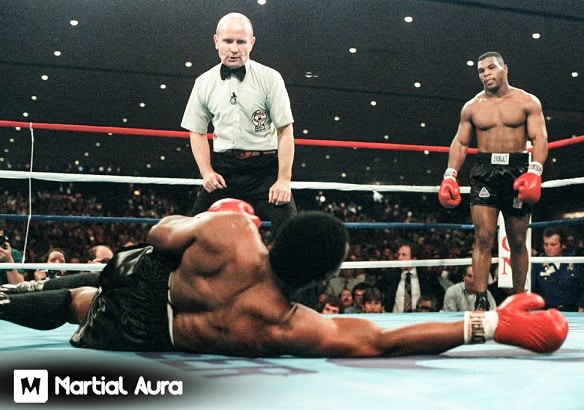
Beyond just wins and losses, Tyson’s career is filled with pivotal moments that helped define his legacy. Let’s take a closer look at some of the most significant bouts in Tyson’s career:
- Trevor Berbick (1986): Tyson’s knockout victory over Berbick earned him the WBC Heavyweight Title, making him the youngest fighter to win the belt at just 20 years old.
- Michael Spinks (1988): In what was billed as one of the biggest fights in boxing history, Tyson destroyed Spinks in 91 seconds. This knockout victory solidified Tyson as the undisputed heavyweight champion, unifying the WBA, WBC, and IBF titles.
- Tyson knocked out Larry Holmes, a former heavyweight champion, in the fourth round. Holmes had never faced a knockout before, making Tyson’s victory all the more impressive.
Tyson’s boxing achievements are not just about the number of wins. These wins impacted the sport of boxing and shaped Tyson’s legacy.
He set numerous records for viewership, and his fights remain some of the most-watched and discussed events in boxing.
Who Has Mike Tyson Lost To?
No career is without its challenges, and Mike Tyson’s losses are as well-known as his victories. You can divide Tyson’s career into two distinct phases: his rise to fame and his later career, which included some surprising defeats.
Buster Douglas: The Biggest Upset in Boxing
One of the most famous moments in boxing, and perhaps the most shocking upset in boxing history, came in 1990 when Tyson faced James “Buster” Douglas in Tokyo.
Going into the fight, Tyson stood undefeated as the undisputed heavyweight champion, while bookmakers viewed Douglas as a massive underdog with odds of 42-1 against him.
Tyson appeared to underestimate Douglas, and after a grueling battle, Douglas knocked out Tyson in the 10th round. The loss was seen as the end of an era, and it marked the first blemish on Tyson’s record.
The Buster Douglas upset is still discussed to this day as a cautionary tale of what happens when a champion overlooks his opponent.
Evander Holyfield: The Infamous Ear-Bite Fight
Another one of Tyson’s notable losses came against Evander Holyfield, a fight remembered not for the boxing itself but for the infamous incident that occurred during the match.
While Holyfield defeated Tyson both times they fought, the ear-bite incident overshadowed their battles and became one of the most infamous moments in sports history.
Other Notable Losses
- Lennox Lewis (2002): Tyson faced Lennox Lewis in a much-anticipated bout that ended with Lewis knocking out Tyson in the eighth round. This loss marked the end of Tyson’s run as a serious contender for the heavyweight title.
- Danny Williams (2004) and Kevin McBride (2005) marked the final chapter in Tyson’s career. Specifically, Williams knocked out Tyson in the fourth round, while McBride forced Tyson to retire on his stool in the sixth. Ultimately, after the McBride fight, Tyson announced his retirement from boxing, acknowledging that his best days were behind him.
Tyson’s Response to Defeats
Though his losses were significant, they never erased the dominance that Tyson displayed in his prime. Tyson’s willingness to step back into the ring after defeats, including his comeback fights, showcases his perseverance and love for the sport.
While these losses mar his record, they also contribute to the complex and fascinating story of his career.
Tyson’s Comeback Fights and Legacy
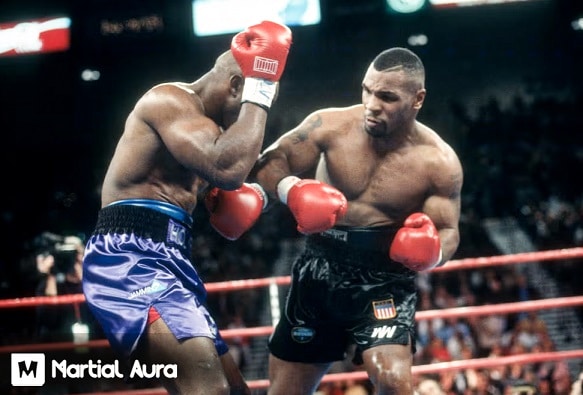
After each defeat, Tyson sought to reinvent himself. His comeback fights featured his attempts to regain the titles he once held and to prove that he still had the ability to compete at the highest level.
Post-Loss Comeback Fights
Tyson’s first major comeback came after his loss to Buster Douglas. Following this upset, Tyson rebounded with several knockout victories, leading up to his infamous bouts with Holyfield. His comebacks after his 1990s prison sentence also drew significant attention, though his career never fully recovered from the setbacks he faced.
- Tyson vs. Jake Paul (Speculated Match): Recently, rumors have circulated about a possible Tyson comeback fight against internet personality and boxer Jake Paul. While nothing is confirmed, the fight has drawn significant media attention. Many speculate about the possibility of seeing Tyson back in the ring, even if in an exhibition fight. While predictions about the fight vary, one thing remains certain: a Tyson return would once again captivate audiences.
Mike Tyson Boxing Record Analysis
Tyson’s career is one of contrasts. On one hand, many recognize him as one of the most dominant fighters in history, especially in his early years. On the other hand, his career featured moments of controversy and defeat.
Knockout Power
Few fighters in history have matched Tyson’s ability to end fights with a single punch. His knockout ratio is one of the highest in boxing, and his early-round knockouts were particularly brutal. For example, in his bout against Michael Spinks
Tyson needed just 91 seconds to knock out the undefeated former heavyweight champion. As a result, Tyson’s power earned him a reputation as a fearsome opponent. Consequently, many of his opponents entered the ring already fearing the inevitable knockout.
Championship Fight Stats
Tyson’s championship fight record is also worth examining. Tyson won a total of 12 title fights, and many of these victories were decisive. His first reign as the undisputed heavyweight champion was particularly impressive, as he held all three major belts (WBC, WBA, and IBF) at the same time.
However, Tyson’s later title fight statistics reveal a different story. After losing to Buster Douglas, Tyson’s attempts to regain his titles were met with mixed results. His losses to Evander Holyfield and Lennox Lewis showed that while Tyson was still a formidable fighter, he was no longer the unbeatable force he once was.
Tyson’s Impact on Modern Boxing
Mike Tyson’s influence on modern boxing cannot be understated. He changed the sport not only with his in-ring dominance but also through his larger-than-life personality. Tyson’s career helped usher in the age of pay-per-view boxing. His fights were some of the most-watched in history, and his popularity transcended boxing, making him a cultural icon.
Tyson’s aggressive style and focus on knockouts inspired a new generation of fighters. For instance, modern heavyweight boxers like Deontay Wilder cite Tyson as a key influence. Moreover, Wilder’s emphasis on knockout victories mirrors Tyson’s early career, in which finishing fights quickly was often the goal.
Post-Retirement Life and Legacy
Since retiring, Tyson has remained in the public eye. His media appearances, including his popular podcast, “Hotboxin’ with Mike Tyson,” have helped him stay connected with fans.
Tyson has also ventured into acting and has made numerous television appearances. He even launched a line of cannabis products, capitalizing on his name and reputation.
Perhaps the most surprising aspect of Tyson’s post-boxing life is how he has managed to turn his image around. After the Holyfield ear-biting incident, many thought Tyson’s legacy would forever be tarnished.
However, in the years since, Tyson has managed to reinvent himself, becoming a beloved figure once again.
His 2020 exhibition match against Roy Jones Jr. attracted significant attention, proving that even years after his prime, Tyson remains one of boxing’s biggest draws.
The fight ended in a draw, but it showed that Tyson’s skills hadn’t entirely faded, even at the age of 54.
The Future of Mike Tyson’s Record and Influence
As we look to the future, Mike Tyson’s legacy will continue to be a major topic of discussion in boxing circles. While his official record remains set in stone, Tyson will likely influence the sport far beyond his time in the ring.
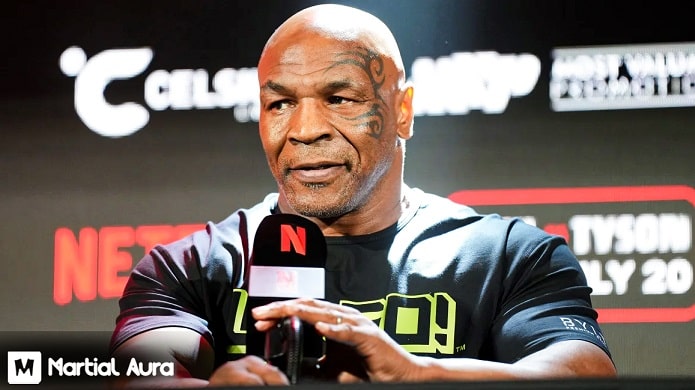
Tyson’s Continued Influence
Tyson continues to impact the sport through his endorsements and training camps. Younger fighters often look up to him, and he has trained and mentored numerous boxers, passing on the lessons he learned during his career.
As boxing evolves, Tyson’s style may become even more relevant. Modern heavyweight fighters are once again focusing on knockout power, with fighters like Deontay Wilder and Anthony Joshua using techniques similar to those Tyson employed in his prime.
The legacy of Tyson’s training under Cus D’Amato’s “peek-a-boo” defense and aggressive attacking style lives on in modern training regimes.
Conclusion
Mike Tyson’s career boxing record is more than just a list of wins and losses. It tells the story of a man who rose to the very top of his sport, only to fall and rise again. Tyson’s 50 wins, 44 of which were by knockout, speak to his devastating power, while his losses remind us that even the most dominant athletes face challenges.
Tyson’s record will forever intertwine with his legacy, and he will continue influencing the sport of boxing for generations to come.

James Wesley is a passionate martial arts enthusiast and the voice behind Martial Aura. With a deep love for UFC and combat sports, he shares expert insights and in-depth analysis on everything from fight strategies to athlete profiles. When he’s not writing, you’ll find him training or watching the latest fights, always learning from the best in the ring.

